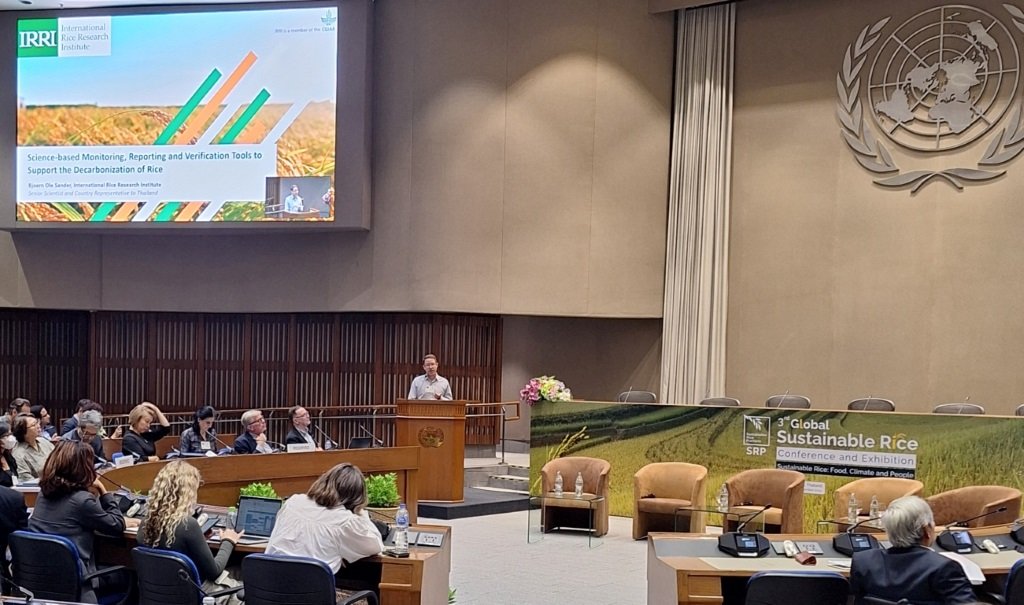The 3rd Global Sustainable Rice Conference and Exhibition 2024 (SRP Conference 2024) took place at the United Nations Conference Centre, drawing together experts, policymakers, researchers, and industry professionals under the theme “Sustainable Rice: Food, Climate and People.” The event emphasized the critical role rice plays in sustainable food systems and addressing climate change, with a focus on aligning rice production with global climate goals.
Aligning Rice Production with Global Climate Goals
A central topic at the conference was the need to align rice production with the Paris Agreement and other international commitments such as the UN Sustainable Development Goals (SDGs). The discussions focused on how to address the environmental impacts of rice cultivation while supporting sustainable development, particularly in the context of the climate crisis. The importance of rice as a staple food for over half the world’s population made it a focal point for global climate action.
Yvonne Pinto, Director General of the International Rice Research Institute (IRRI), delivered the keynote address during the opening ceremony of the sustainable rice conference. Pinto emphasized the urgency of transforming the global rice sector to align with the goals of the Paris Agreement and the Methane Pledge. She also highlighted rice’s importance in supporting multiple SDGs, underscoring its pivotal role in fostering sustainable development and addressing climate challenges.
Sustainable Practices at Rice Conference
Kazuki Saito, Senior Scientist at IRRI, participated in discussions on sustainable rice production practices tailored for smallholder farmers. A key focus was on “Zero-burning” residue management techniques, which help reduce emissions and improve soil health. Saito also shared insights on ongoing research projects at IRRI, which are working to create scalable and sustainable solutions for rice cultivation. These efforts include developing low glycemic index rice varieties, straw management options, and agronomic solutions co-developed under the CGIAR initiative “Excellence in Agronomy.”
Leveraging Climate Finance and Carbon Markets
The sustainable rice conference also explored the role of climate finance and carbon markets in funding low-emission rice technologies. Discussions emphasized the need for scalable investments and the development of collaborative strategies to drive the adoption of these technologies. While various projects are already using grants and carbon finance mechanisms to scale low-emission rice practices, participants noted that further investment is required, particularly as the current carbon price for avoidance projects remains too low to make these projects economically viable.
Also read: CFCL, TERI Collaborate to Establish Centre for Sustainable Agriculture Solutions
Advancements in Monitoring and Reporting Systems
Bjoern Ole Sander, IRRI’s Country Representative to Thailand, contributed to discussions on the decarbonization of rice cultivation through the use of transparent and cost-effective Monitoring, Reporting and Verification (MRV) systems. He highlighted the potential of IRRI’s tools, such as RiceMoRe, combined with remote satellite observation technologies, in tracking and reducing rice emissions. These tools are part of IRRI’s broader efforts to develop technologies that lower greenhouse gas emissions in rice cultivation and improve sustainability in the sector.
Fostering Global Collaboration for a Sustainable Future
The Sustainable Rice Conference 2024 provided a platform for global stakeholders to align efforts in addressing the environmental impact of rice production while enhancing the livelihoods of smallholder farmers. The event showcased innovative projects, funding opportunities, and technological tools designed to promote sustainability and climate resilience in the rice sector. Through these collective efforts, the rice conference aimed to pave the way for a more sustainable and climate-friendly future for rice cultivation worldwide.


